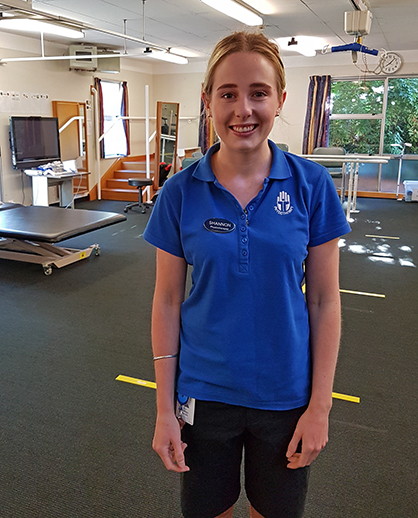In her senior year at St Peters College in Palmerston North, one young student prompted by a teacher, set out to create her first ever CV.
After only a few seconds thought, physiotherapist Shannon Hollard jotted down the word 'healthcare'.
Not all students enter the School of Physiotherapy with such clear purpose, but she is certain that a physiotherapy career is right for her.
A patient-centred profession

Shannon arrived in Dunedin with four keen school-mates, ready for their demanding first year of Health Science studies.
She soon noticed the friendly and collaborative atmosphere at the School of Physiotherapy.
Dunedin offers a great student experience, and Shannon was able to do well in her studies while having an excellent and active social life.
She tells us that she did notice a gap between classmates fixed on finding careers at the top level in elite sport, and students like herself who believe that physiotherapy is a very patient-centred profession.
While she had been strong in science at school, it was persistence and curiosity which sustained Shannon's efforts through to graduation day at Otago.
Shannon tells us that her fourth-year placement with School alumnus Mark Shirley at Southern Rehab in Dunedin was inspirational. Mark specialises in neuromuscular rehabilitation, and she learned much from his willingness to listen to patients at every encounter, to better understand their conditions. He takes a holistic approach to each aspect of his clinical work.
Learning from experience
Shannon is now completing a phase of work at Dunedin's Wakari Hospital. It involves working with the under 65's, helping outpatients with a wide range of musculoskeletal conditions, improving women's health, assisting in the High Dependency Unit, and helping to treat those with MS.
At times it has been a steep learning curve.
'Rotation', which involves the treatment of a wide range of conditions often in rapid succession has been very useful in developing her confidence and her ability to 'think on her feet' in the busy hospital setting.
Like many new physios Shannon aspired to fix every patient she encountered. She now describes herself as more of a realist, and believes that the clinician must work to build a high level of trust. Physios bring a 'toolbox' of treatment options, and apply each in succession, to reveal the most effective approach for each individual patient. Yet over and above any application of technique and method, there must first be trusting collaborations between the physiotherapist and patient, with peers and colleagues, and with the families and those who support the patients in their daily lives.
Shannon encourages self-management for patients but she has found that psycho-social factors do have an impact upon an individual's willingness to accept responsibility for their own health and rehabilitation.
She favours a preventative approach to physical health and well-being; one which emphasises building trust and fostering relationships and matches the expectations of therapist and patient as much as practical. And being persistent.
When asked to summarise her approach, she recalls the useful phrase "diagnose-assess-reassess-educate-motivate-monitor"
Bright future in physiotherapy
With a ticket to London already in her pocket, Shannon is a little nervous but looking forward to new professional challenges.
Because physiotherapy graduates from Otago are at work all over the world, she is optimistic about finding an enjoyable role without too much delay.
Postgraduate studies may be an option a little later on, but for now Shannon is really keen on forging a career as a practical, clinic-based physiotherapist with a special interest in the field of neurorehabilitation
We at the School of Physiotherapy wish her every success.
Shannon Hollard who graduated in 2015, holds a Bachelors degree (BPhty) in Physiotherapy from the School of Physiotherapy at Otago.